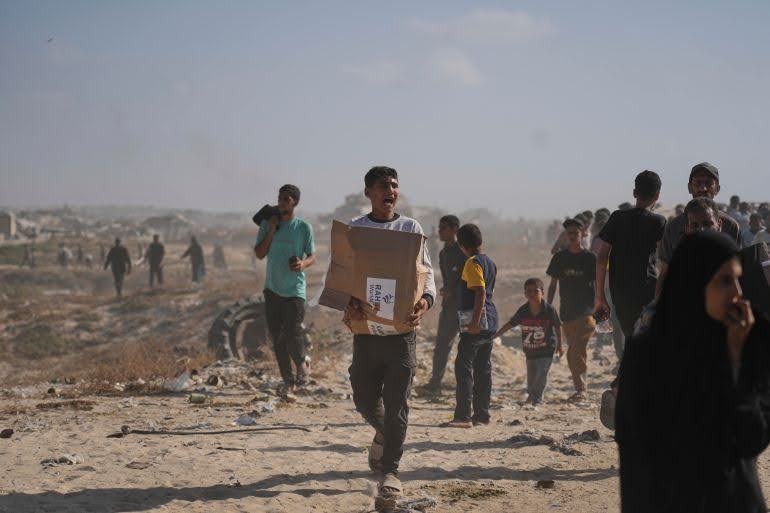Over 500 Palestinians Killed While Waiting for Aid: Gaza Faces Starvation and Targeted Attacks Amid Global Silence
More than 500 Palestinians were killed while seeking food aid in Gaza. Israeli forces target starving civilians. The UN warns of a looming famine and fuel crisis.
NEWSREPORT
Refaat Ibrahim
6/25/20253 min read


In a devastating escalation of the humanitarian crisis in Gaza, the local government has confirmed that more than 500 Palestinians have been killed in the past month alone while waiting for food aid. The victims, overwhelmingly civilians, were gunned down by Israeli forces as they gathered near distribution points in desperate attempts to feed their families.
Activists have circulated heartbreaking footage online showing dozens of bodies of the deceased piled up outside hospitals, most recently in the courtyard of Nasser Hospital in Khan Younis. These scenes underscore a growing catastrophe, where starvation and violence intersect in the besieged enclave.
Dangerous Aid Distribution Under Fire: A U.S.-Israeli Plan Without UN Oversight
On Wednesday morning, nine civilians were killed near the Nitzarim corridor in central Gaza while awaiting aid. This attack followed Tuesday’s announcement by Gaza’s Government Media Office that 516 civilians had been killed and 3,799 injured since the controversial aid delivery mechanism backed by the United States and Israel began on May 27, 2024.
The so-called “Gaza Humanitarian Foundation” operates outside the supervision of the United Nations or major humanitarian agencies. Human rights groups and UN officials have widely condemned the mechanism for being politically motivated, inefficient, and dangerous.
The Israeli-American distribution method bypasses neutral oversight and sends Palestinians to unprotected, militarized zones, turning food lines into death traps. Many are shot while simply trying to obtain food for survival.
Documented Genocide: Food Lines Become Killing Zones Amid Starvation
The broader context is even more alarming. Since October 7, 2023, Israel has carried out a systematic and brutal campaign in Gaza described by human rights experts as genocide. Backed by the U.S., the campaign includes indiscriminate bombings, forced displacement, and a total blockade, including restrictions on food, water, fuel, and medicine.
According to updated figures, over 188,000 Palestinians have been killed or injured, including a staggering number of women and children. More than 11,000 people are missing, with thousands presumed dead beneath the rubble or buried in mass graves. Famine is now widespread, with infants and the elderly among the hardest hit.
Stephane Dujarric, spokesperson for the UN Secretary-General, has issued stark warnings: “If fuel is not allowed into Gaza immediately, children will die of thirst.” He added, “The killing of civilians while waiting for humanitarian aid is unacceptable. The numbers do not lie.”
Dujarric emphasized that the United Nations cannot continue its humanitarian work without fuel and safe access. "People are dying while trying to get food. That is a humanitarian tragedy beyond description," he stated.
Humiliation and Hunger: A Distribution Model That Endangers Lives
The U.S. company overseeing aid delivery has come under fire for using a method described by multiple human rights organizations as degrading, unsafe, and inhumane. Palestinians are forced to line up in exposed areas, often without any security, becoming easy targets for Israeli gunfire.
Hospitals across Gaza reported that 80 Palestinians were killed on Tuesday alone, with 56 of them shot while seeking aid in Nitzarim and Rafah. These numbers continue to rise daily, turning aid centers into predictable massacre zones.
Meanwhile, the UN and its agencies, including UNRWA, are being deliberately sidelined by Israel. Tel Aviv has levied unproven accusations against these organizations, claiming they support Palestinian resistance groups, thereby justifying the obstruction of their humanitarian operations.
Dujarric rejected these claims and reaffirmed the UN’s commitment to its mission in Gaza. “We will not leave. We will continue to operate in whatever narrow space is available to us,” he said, even as Israel has physically targeted UN facilities and workers.
No Solution Without Politics: A Humanitarian Crisis Worsens by the Hour
Despite continuous efforts by the UN to negotiate access, secure aid corridors, and de-escalate the conflict, Dujarric admitted there's little optimism. “Time is running out. Food is running out. Fuel is running out,” he warned. “We need safe and unrestricted access to every family in Gaza. That’s the only way to prevent more death.”
The only slight easing of the crisis came during brief ceasefires, during which hostages were exchanged and humanitarian aid was temporarily allowed. But these were short-lived, and conditions on the ground have since worsened drastically.
The UN insists it is not the only body capable of delivering aid, but it demands that all humanitarian actors be allowed to function without threat or interference. Dujarric stressed, “What is happening now is not humanitarian assistance; it is militarized, politicized aid that does more harm than good.”
He concluded by calling for a diplomatic and political resolution, stating clearly that the ongoing siege, bombardment, and starvation will not solve anything. Only meaningful negotiations and respect for international law can end this atrocity.
Awareness
Documenting reality, amplifying Palestinian voices, raising awareness.
Contact Us:
resistant.p.pens@gmail.com
Follow our social media
